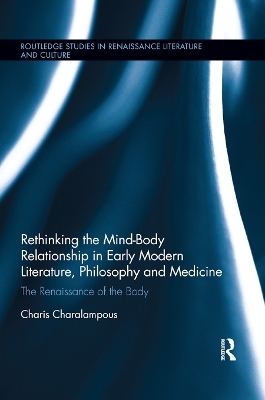
Rethinking the Mind-Body Relationship in Early Modern Literature, Philosophy, and Medicine
The Renaissance of the Body
Seiten
2019
Routledge (Verlag)
978-0-367-87132-1 (ISBN)
Routledge (Verlag)
978-0-367-87132-1 (ISBN)
This book considers the works of early modern physicians, thinkers, and writers who explored the phenomenon of the independent and intelligent body, shedding new light on historical and literary issues relating to the treatment, perception, and representation of the human body. It examines the notion of the thinking body across a range of genres
This book explores a neglected feature of intellectual history and literature in the early modern period: the ways in which the body was theorized and represented as an intelligent cognitive agent, with desires, appetites, and understandings independent of the mind. It considers the works of early modern physicians, thinkers, and literary writers who explored the phenomenon of the independent and intelligent body. Charalampous rethinks the origin of dualism that is commonly associated with Descartes, uncovering hitherto unknown lines of reception regarding a form of dualism that understands the body as capable of performing complicated forms of cognition independently of the mind. The study examines the consequences of this way of thinking about the body for contemporary philosophy, theology, and medicine, opening up new vistas of thought against which to reassess perceptions of what literature can be thought and felt to do. Sifting and assessing this evidence sheds new light on a range of historical and literary issues relating to the treatment, perception, and representation of the human body. This book examines the notion of the thinking body across a wide range of genres, topics, and authors, including Montaigne’s Essays, Spenser’s allegorical poetry, Donne’s metaphysical poetry, tragic dramaturgy, Shakespeare, and Milton’s epic poetry and shorter poems. It will be essential for those studying early modern literature, cognition, and the body.
This book explores a neglected feature of intellectual history and literature in the early modern period: the ways in which the body was theorized and represented as an intelligent cognitive agent, with desires, appetites, and understandings independent of the mind. It considers the works of early modern physicians, thinkers, and literary writers who explored the phenomenon of the independent and intelligent body. Charalampous rethinks the origin of dualism that is commonly associated with Descartes, uncovering hitherto unknown lines of reception regarding a form of dualism that understands the body as capable of performing complicated forms of cognition independently of the mind. The study examines the consequences of this way of thinking about the body for contemporary philosophy, theology, and medicine, opening up new vistas of thought against which to reassess perceptions of what literature can be thought and felt to do. Sifting and assessing this evidence sheds new light on a range of historical and literary issues relating to the treatment, perception, and representation of the human body. This book examines the notion of the thinking body across a wide range of genres, topics, and authors, including Montaigne’s Essays, Spenser’s allegorical poetry, Donne’s metaphysical poetry, tragic dramaturgy, Shakespeare, and Milton’s epic poetry and shorter poems. It will be essential for those studying early modern literature, cognition, and the body.
Charis Charalampous is the Toby Jackman Isaac Newton Research Fellow at St Edmund's College, Cambridge, UK.
1. Introduction: Intelligent Bodies in Early Modern Philosophy, Medicine and Literature 2. Montaigne’s Corporeal Self: A Dialectics of Bisubjectivity and its Medicinal Virtues 3. The Allegory of the Body and the Body of Allegory in Spenser’s The Faerie Queene 4. Thinking (of) Feelings: Reaching for the Divine in Donne’s Poetry 5. The Intelligent Body on the Stage and the Wonder of Tragic Pleasure 6. Milton’s Prophetic Mission: At the Boarders of Poetry and Music 7. Epilogue: The Afterlives of the Intelligent Body
| Erscheinungsdatum | 23.12.2019 |
|---|---|
| Reihe/Serie | Routledge Studies in Renaissance Literature and Culture |
| Verlagsort | London |
| Sprache | englisch |
| Maße | 152 x 229 mm |
| Gewicht | 453 g |
| Themenwelt | Literatur ► Lyrik / Dramatik ► Dramatik / Theater |
| Sachbuch/Ratgeber ► Gesundheit / Leben / Psychologie ► Esoterik / Spiritualität | |
| Geisteswissenschaften ► Psychologie ► Allgemeine Psychologie | |
| Geisteswissenschaften ► Psychologie ► Verhaltenstherapie | |
| Geisteswissenschaften ► Sprach- / Literaturwissenschaft ► Anglistik / Amerikanistik | |
| Geisteswissenschaften ► Sprach- / Literaturwissenschaft ► Literaturgeschichte | |
| Geisteswissenschaften ► Sprach- / Literaturwissenschaft ► Literaturwissenschaft | |
| ISBN-10 | 0-367-87132-7 / 0367871327 |
| ISBN-13 | 978-0-367-87132-1 / 9780367871321 |
| Zustand | Neuware |
| Haben Sie eine Frage zum Produkt? |
Mehr entdecken
aus dem Bereich
aus dem Bereich
Der Tragödie erster und zweiter Teil. Urfaust
Buch | Hardcover (2021)
C.H.Beck (Verlag)
CHF 15,90


